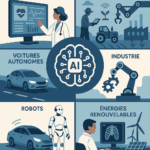Artificial Intelligence (AI) is a rapidly growing field, and the forecasts for the years 2025 and 2026 are particularly promising. Current advancements suggest that AI will continue to transform our lives, both professionally and personally.
So, with the help of Gemini, Claude and ChatGPT, I’ve prepared a quick overview of what the future of AI can be. I was finding the idea to ask this directly to those well-known generative AI tool, at least to be able to compare their return. Here are the main areas of AI evolution that can be expected over the next two years, through AI’s eyes – supposing they have some.
The list is composed starting from the Claude answers, completed by ChatGPT and / or Gemini if they proposed the same topic. For each point, you see which of the three LLM proposed the topic.
Architectural Advancements

- Mixture of Experts (MoE) Dominance: Models like Claude 3 Opus and GPT-5 will further refine sparse expert architectures, significantly improving efficiency while maintaining or exceeding performance levels


- Multimodal Integration: Deeper fusion of language, vision, audio, and other modalities with more sophisticated cross-modal reasoning capabilities. Think advanced virtual assistants that can understand and respond to complex instructions involving different media formats, or diagnostic tools in healthcare that combine image analysis with patient history and genetic data.

- Architecture Diversification: Beyond transformer-based models, we’ll see competitive alternative architectures emerging


- Increased focus on explainable AI (XAI): The “black box” nature of some AI models will be increasingly addressed with techniques to make their decision-making processes more transparent and understandable. Explainable AI models that can articulate their decision-making processes will see significant advancement. This will be crucial for building trust and ensuring responsible deployment, particularly in sensitive areas like healthcare and finance.

- Generative AI advancements in creative fields: Expect further improvements in generative models for creating realistic images, videos, music, and even code. These models will become more sophisticated in understanding and responding to creative prompts, enabling wider adoption in artistic expression, content creation, and design.
Technical Capabilities

- Context Windows: Extending beyond 1M tokens toward practical infinite context through retrieval augmentation and memory mechanisms.

- Reasoning: More sophisticated multi-step reasoning with better logic, planning, and causal understanding.

- Tool Use: AI systems will become more adept at self-directed tool use, with standardized interfaces for controlling external systems.

- Personalized and adaptive AI experiences: AI models will become increasingly adept at tailoring experiences to individual users, learning from their preferences and behavior. This will lead to more personalized recommendations, adaptive educational tools, and customized healthcare interventions.

- Generalization and Robustness: AI systems are likely to become more generalized, improving their ability to adapt to a wider range of tasks without extensive retraining. This evolution will enhance their robustness and reliability, making them more capable in dynamic environments.
Industry Applications

- Code Generation: Full software development lifecycle assistance, with systems capable of maintaining, refactoring, and debugging entire codebases.

- Scientific Research: AI assisting in hypothesis generation and experimental design across fields like materials science and drug discovery.


- Enterprise Integration: More seamless integration with business workflows, with specialized systems for particular industries. Sectors like manufacturing, logistics, customer service, and finance will see significant transformations driven by AI-powered solutions.

- Domain-Specific AI: AI will continue to advance in specialized fields with tailored algorithms. Industries like healthcare, finance, and agriculture will benefit from bespoke solutions that leverage domain-specific data and requirements.
AI Infrastructure


- Compute and Engery Efficiency: Major innovations in training and inference optimization to reduce computational requirements. Which will be corelated with a reduction of the carbon footprint of AI training and inference.

- Specialized Hardware: More diverse AI accelerators optimized for specific workloads (training vs. inference, specific model architectures)



- Edge AI: More capable on-device models with reduced latency and power requirements

- Quantum Computing and AI: The integration of quantum computing could start to have a tangible impact on AI algorithms, offering breakthroughs in processing power that could solve problems currently infeasible for classical computers.
Societal Impact

- AI Governance: More mature regulatory frameworks globally, balancing innovation with safety

- Labor Markets: Clearer patterns of job transformation will emerge, with more defined complementary roles between humans and AI

- Education: Significant transformation of educational approaches to better integrate AI as a tool while focusing on distinctly human skills


- Growing emphasis on AI safety and ethics: As AI systems become more powerful and integrated into our lives, concerns around bias, fairness, and potential misuse will intensify. Expect to see greater investment in research and development of techniques for robust and ethical AI, along with increased regulatory scrutiny. We can expect new guidelines addressing ethical concerns, privacy, and data protection, ensuring AI is developed and used responsibly.

- Human-AI Collaboration: AI will increasingly be seen as a collaborative tool, with advancements in natural language processing and human-machine interfaces. AI will assist in creative professions, scientific research, and complex decision-making, enhancing human capabilities rather than replacing them.
Conclusion
The answers of Claude are more focused on new technical challenges and opportunities. But it doesn’t deny the importance of governance into AI. It is the only one to take education into consideration, proposing transformation of educational approaches that prevailed until now, to incorporate AI.
Gemini is less focusing on technology aspects, treating them equally with other important aspects for the society: explainable AI and ethic.
ChatGPT is the only one to explicitly mention the human-AI collaboration and the sustainability aspect of AI. It is also the only one to take into consideration the quantum computing aspect, even if it is not that detailed.
The common part to all three sets of prediction is about the edge AI or AI that can be directly onboarded into any kind of devices, and the extension of the LLM toward something more sophisticated, more able to understand the context and able of more in-depth reasoning. Without never named it, they really tends to describe the Graal of all LLM, the AGI (Artificial General Intelligence).

